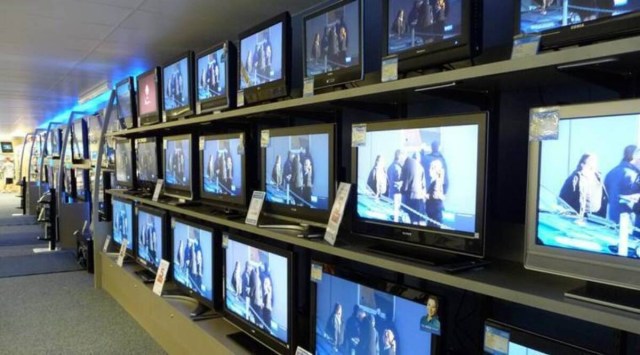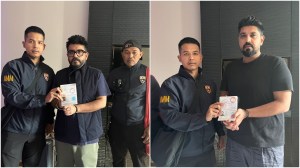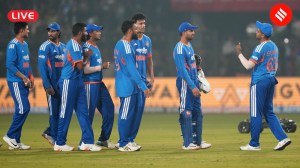Question to broadcast body | On hate speech, SC asks: Have TV anchors been taken off air?
Justice Joseph posed the query when Bhambani said the Authority had taken quick and effective action whenever it receives a complaint regarding a programme aired by any of its members.
 Responding to what the government is planning to regulate hate speech on TV etc, Nataraj said it is planning changes to the criminal law.
(Representational/ File)
Responding to what the government is planning to regulate hate speech on TV etc, Nataraj said it is planning changes to the criminal law.
(Representational/ File) The Supreme Court Friday favoured action against television anchors who act unfairly during debates and sought to know how many times an anchor has been taken off air over a programme.
“How many times have you taken off anchors? Have you dealt with anchors in the way you send a message?”, Justice K M Joseph, heading a two-judge bench, asked Advocate Nisha Bhambani appearing for the News Broadcasting Standards Authority (NBSA) hearing a batch of cases involving allegations of hate speech.
Justice Joseph posed the query when Bhambani said the Authority had taken quick and effective action whenever it receives a complaint regarding a programme aired by any of its members.
Appearing for the government, Additional Solicitor General K M Nataraj, responding to demands to moderate the content on TV, told the bench, also comprising Justice B V Nagarathna, that there are sufficient check and balances in place.
Justice Joseph responded that “checks and balances are certainly not being advised in a manner which produces result”.
He said anchors sometimes shut down people from expressing their views. “Many of these TV programmes, you don’t allow people to talk on an equal basis. Participants you don’t want to express their views, you will either mute them, or allow the other person to go on the whole time unchallenged”, he said adding “so the point is it is not the right of the broadcaster or the views of the panelist. It is the right of the persons who are viewing it”.
Justice Joseph added that “one of the ways (to exercise the check and balance) is if you have an erring anchor, the key actually is handled by the anchor, in a live programme the fairness of the programme is ultimately with the anchor, if the anchor is not acting in a fair manner…if you take strong action against anchors, what will happen (is), immediately they will know it’s not going to pay. On the other hand, I will have to pay a heavy price, I will be taken off the air…There is a power to take off anchors also”.
Justice Joseph said he would attribute the conduct of channels to what Adi Sankaracharya had said ‘udaranimitham, bahukritha vesham’ (many things are done for the stomach).
“All of this ultimately is traced to your udaram (stomach). What is happening is driven by TRP. This is the fundamental problem. Channels are basically competing with each other. Unfortunately, you are not doing anything about it. They sensationalise certain things. You should understand, unlike some reading a newspaper, somebody who watches a television, the visual part in the brain, immediately they appeal, particularly the youngsters, they get glued to it. And you create divisions among society or you create whatever opinion you want to create much faster than any other medium”, he told the NBSA counsel.
Justice Joseph added that “ultimately” it is the anchor and the editorial who control the content and asked, “if the anchor is himself or herself a part of the problem?”
Delving on how to regulate TV while balancing the right to free speech, Justice Joseph said: “On the one hand it’s freedom of speech…The greater the freedom, the better the marketplace of ideas theory is very good. But in the marketplace of ideas we also have to see the kind of populace….The problem with freedom is it really depends on the audience. Are they mature enough to receive the kind of information or misinformation that is dished out? If freedom is exercised with an agenda, if you are promoting a particular agenda, then you are not serving actually the people. You are serving some other cause of somebody else. Then you have to be dealt with”.
Referring to the incident of the man accused of urinating on a fellow passenger during a flight, Justice Joseph said: “The kind of words that had been used for him, he is an undertrial. Let them do what they want for TRP. But please see to it that when you use words, you don’t denigrate anyone. Human dignity is involved…It’s a part of Article 21”.
“When you are exercising your constitutional right of freedom of press etc, you should act like you deserve it. Right should be exercised in the proper manner. Otherwise what dignity is left to the nation…”, he added,
Justice Joseph pointed out that in the US under the First Amendment, freedom of press is preserved and “they allow free speech till two things happen. One is fighting words theory and incitement to violence. In England also, they are fighting short of encroaching freedom of speech. So they will not interfere. In Europe also, they are not very very enamoured of the idea of restricting free speech”.
He added that in India, the problems are completely different and there is a constitutional provision — Article 19(2). “But we are only telling you free speech also has to be protected”.
Added Justice Nagarathna, “That’s why these petitions are not really with regard to 19(2) as such, it is the exercise of 19(1)(a) rights and how in exercise of those rights, there is a violation of Article 21 or another person’s Article 19(1)(a) rights.”
Justice Joseph said people in the media must have to realise that they occupy positions of strength. “…And any misuse by them, by anyone who goes and sits in the channel is impacting the whole nation. Because people who watch them, they will not be in a position to immediately find out what really is the truth. They will take whatever is being said as the truth and assimilate into their systems and accordingly condition their life which is very very dangerous.”
At the last hearing, the SC had asked the DGPs of Delhi, Uttarakhand and Uttar Pradesh to register suo motu action against those indulging in “hate speech” by lodging criminal cases without waiting for formal complaints.
Friday, the counsel for Uttarakhand told the court that pursuant to the order, the state registered 118 cases of which 23 are suo motu and the rest on the basis of complaints.
The state counsel said there were some practical difficulties. When a police officer registers a case suo motu, the officer becomes the complainant and then the investigation becomes subjective instead of being objective. When the police officer is the complainant, there is no question of the police saying the charges are not correct, he added.
To a query from the bench, he said investigation in the cases is going on.
Uttar Pradesh informed the court that it had registered 581 cases in 2021 and 2022 and that 160 of these were suo motu. The court noted that the figure for 2022 was almost 2.5 times that of 2021.
Responding to what the government is planning to regulate hate speech on TV etc, Nataraj said it is planning changes to the criminal law.
“We have sought input from various stakeholders, different states. We have been getting these inputs…Ultimately, it has to go to the Parliament. It’s a legislative exercise….After collecting all the inputs, we have to suggest appropriate legislation…I can’t speak for the legislation”, he said.







